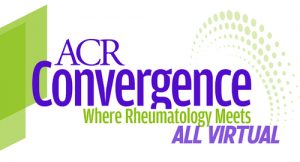The ACR recognizes this year has presented incredible challenges, but focusing on the future will help all of us move forward. Taking place Nov. 5–9, ACR Convergence 2020—the ACR’s renamed and reconceptualized annual meeting—will be a fully virtual opportunity for the global rheumatology community to come together to collaborate, innovate and learn.
The ACR Convergence program includes four 30-minute sessions that will offer brief overviews of disease states and their management, focusing on rheumatoid arthritis (RA), bone health, joint health and psoriatic arthritis. These shorter sessions, called Down & Dirty 30, will be presented in a new format designed to help pivot the conference to an online format. The sessions will provide crash courses or refreshers on select rheumatology topics with a nuts-and-bolts focus, according to Julie Schwartzman-Morris, MD, associate professor, Department of Medicine, Rheumatology, Donald and Barbara Zucker School of Medicine at Hofstra/Northwell, Hempstead, N.Y., and a member of ACR’s Annual Meeting Planning Committee.
“That’s why it’s called Down & Dirty 30,” says Dr. Schwartzman-Morris. “It’s kind of like a few bullet points for anyone who needs a refresher on treatment guidelines and if there are any new recommendations on making diagnostic decisions or diagnostic dilemmas—that’s the idea.”
Two presentations will address exercising for bone and joint health, and are well suited for conference participants new to rheumatology, as well as clinical pharmacists, trainees or research professionals who want a disease-state refresher in a concentrated block, according to session coordinators.
“Exercise is well known to positively affect and improve bone and joint health for individuals across the lifespan,” says Elizabeth Wellsandt, PT, DPT, PhD, OCS, assistant professor, Physical Therapy Education Division, University of Nebraska Medical Center (UNMC), Omaha, and a session coordinator. “Clinicians will become more confident in understanding the mechanisms of action, necessary precautions and recommended approaches of exercise to improve bone and joint health for patients with rheumatic disease.”
Down & Dirty 30: Therapeutic Exercise for Bone Health
Laura D. Bilek, PT, PhD, associate dean for research, College of Allied Health Professions, UNMC, will explore the role of exercise in a treatment plan to maximize bone health in patients with rheumatic conditions, who are likely to have decreased bone density and increased fracture risk. Dr. Bilek will discuss the use of evidence-based exercise interventions to improve bone health and decrease fracture risks. She will also cover how to modify therapeutic exercises for people at high risk for fractures and offer specific precautions people with rheumatic diseases or osteoporosis should be advised to take before beginning an exercise program.


